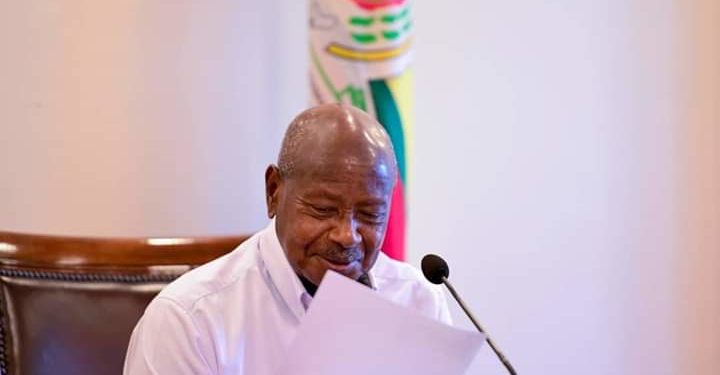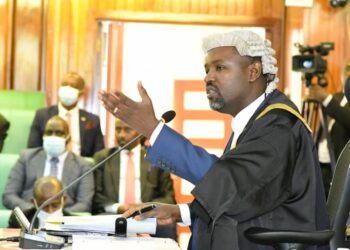A group of youth under Uganda Poor Youth Movement have petitioned President Yoweri Museveni to deal with incompetent Bank of Uganda officials who have led to the loss of taxpayers money in a court case against former Crane Bank shareholders.
The youth want the President to save taxpayers from costs brought by Central Bank staff in the case of Crane bank under receivership against Meera Investments and businessman Sudhir Ruparelia.
“We are writing to inform you that, on 23rd June 2020, in the middle of the COVID 19 Pandemic, in the worst period for all Ugandans locked down, the Court of Appeal (court) ruled yet again against Crane Bank Limited in Liquidation (CBL) in a case where BoU filed to recover UG Shs 397bn from Dr Sudhir Ruparelia claiming that he allegedly siphoned the same from CBL before it was closed and sold in 2017,” Zahid Ssempala, the Uganda Poor Youth Movement Spokesperson said in a petition dated 13 July, 2020.
Ssempala noted that “It ought to be noted, that under HCCS 493 of 2017 the High Court had dismissed the case on the grounds among others that Crane Bank Limited (CBL) once put under receivership lost its ability to sue, that the statutory time for receivership was limited to 12 months. That Crane Bank Limited was a foreign company and lacked locus to own land Free Hold or own the 48 properties that had been seized by the BOU and sold to DFCU bank and that there was no cause of action as there was nothing to sue for, as all assets had been sold to DFCU bank”.
“Upon dismissal of the case, CBL / BOU was condemned to pay costs of the suit which was at that time at 25% per annum of a sum believed to be in billions of shillings plus other legal costs.”
The petitioner explains that the greed in the BoU Legal Department misled the Board to authorise an Appeal which was filed to the Court of Appeal Civil appeal No. 252 of 2019 “this appeal was dismissed and the costs awarded to Meera investments limited and Sudhir Ruparelia yet again. The total taxed bill is yet to be filed which according to Legal experts could be anything on the region of 150bn which will be visited on the tax payers’ money, as BoU does not have its own money to pay those costs and will have to seek for recapitalization or a refund from Government after payment”.
“Your Excellency, it should be worth noting that, the Government is currently facing deep budget cuts and might not realize the 22 Trillion budget for 2020/2021..This condition will be further aggravated by payment of the legal costs by tax payers in the suit which by law must be paid and considering views/ analysis of legal experts will be lost again in the Supreme Court in the event of an Appeal,” he stressed.
“BoU has a litany of lost cases where billions have been paid to claimants and winners of cases. The performance of the Bank’s Legal Department could be as a result of over reliance on so called external legal experts who are bent on appealing any losses given that they will be paid. And as it is common knowledge, the higher they Appeal, the higher their fees. A law firm billed BoU over 13bn for services in the CBL closure which services where later on regarded as ineffective and contrary to the law by COSASE as parliament faulted BOU in deliberately disregarding the law or legal procedures in the process of closure of CBL, which leaves one wondering why the said “legal experts” were paid a hefty 13bn for wrong advice.”
“Your Excellency, this cannot be sustained anymore by the taxpayer given the dwindling tax base consumed by the negative impact of COVID 19 on the Government’s bottom line.”
He also stressed that the case of closure of CBL and indeed other Banks have been a subject of investigation and probe by parliament and others which established that BOU had not done its job well and COSASE made a raft of proposals for reform of supervision and Legal Department which have all been washed aside by the Bank and the Ministry of Finance which should have given Parliament and Cabinet an update of the progress in implementing the COSASE recommendations.
“Instead the BoU has continued to accumulate costs in lost cases especially on CBL which ceased to be a Legal matter when it was evident the closure had all the hallmarks of a failed and botched regulatory action.
“Your Excellency, you have recently demonstrated your ability to axe incompetent public officials who have either failed to execute their mandate or caused loss to Ugandan tax payers. We beg you to take action over the incompetence in our mother bank. As soon as the ruling was made dismissing the Appeal, the same Legal Head Mrs Margaret Kasule was summoned by the Board which was sitting on that same day to advise on way forward and as expected, the Legal Head advised that the only way out of this was through an appeal to the Supreme Court. Indeed several interactions and engagements are underway to file an appeal to the Supreme Court where one of the Justices who dismissed the case is likely to be seated again this time as Chief Justice as he is Acting Chief Justice at the moment”.
The petitioners further said that the case which has so far cost Ugandans in excess of Shs20bn in costs to Lawyers is a waste of public resources.
“The COVID 19 pandemic has slowed down productivity, Ugandans have borne the brunt of biting poverty, revenue collection estimates have been reduced drastically fiscal discipline and austerity measures have been proposed and now Ugandans have to watch and see as the usual mistakes are being repeated by the same advisors misleading the BoU Board into entering a bottomless pit that is likely to cost BoU an arm and a leg,” Ssempala noted.
“Your Excellency, as your Bazukulu and Tax payers who feel the pinch of our monies being wasted by BOU in endless litigation, the purpose of this petition is to say enough is enough. Let this wanton disregard to the financial bleeding of BoU STOP HERE. Let Sudhir Ruparelia be paid his money and let Ugandans start with a new slate. Uganda has bled enough, let these costs not be multiplied in the Supreme Court not to forget the interest and damages the bank will continue to incur, at the end of this all it’s we the tax payers to suffer. Let BoU Board meet and consider settling this matter given that out court and Alternative Dispute Resolutions are valid methods of settling cases.”
Last month, BoU announced it would be appealing the recent Court of Appeal ruling, which upheld an earlier High decision to dismiss a case that had been filed against Sudhir by Crane Bank in receivership. The Central bank said it was intending to take the matters to the Supreme Court.
The Panel of judges led by acting Chief Justice Alfonse Owiny- Dollo upheld the judgment of Commercial Court judge David K. Wangutusi in application filed by Bank of Uganda seeking a refund of Shs397 billion from Sudhir which he allegedly siphoned from the defunct Crane Bank. Court dismissed case with costs.
Bank of Uganda/Crane Bank in receivership (BoU) had appealed against an August 26, 2019 ruling where the High Court Commercial division dismissed with costs, the multi-billion lawsuit.
In his ruling, Justice Wangutusi stated that BoU/Crane Bank (in receivership) did not have a legal basis to sue Sudhir, the owner of Crane Bank, then the second biggest bank in Uganda.
Court ordered Bank of Uganda to pay Sudhir’s legal costs.
However in a statement days later, Central Bank Governor Emmanuel Tumusiime Mutebile said that receivership does not take away the corporate personality of a company which includes the right to trace and recover assets and the right to sue for those assets.
The Central Bank also says neither the High Court nor the Court of Appeal has yet considered or taken a decision on the claims for wrongful and illegal extraction of funds from Crane Bank as claimed in the main suit.
“The implications of these judgments are that a Receiver of a financial institution/bank cannot pursue or seek recovery of assets of a bank in receivership by way of legal proceedings,” Mutebile said.
Mutebile further warned that such court rulings could set a dangerous precedent.
“The implications of these judgments are that a Receiver of a financial institution/bank cannot pursue or seek recovery of assets of a bank in receivership by way of legal proceedings. This renders the principle of tracing and preserving assets of an insolvent bank during statutory management and receivership futile,” Mutebile said.
“The judgements also set a precedent that limits the Central Bank’s capacity to resolve banks in a manner that ensures accountability for mismanagement of depositor funds and promotes good corporate governance in the banking industry.”
BoU /Crane Bank in Receivership had sued the property mogul and Meera Investments Limited for allegedly fleecing the defunct Crane Bank Limited (CBL) of Shs397 billion that the central bank wanted refunded.
Sudhir denied the allegation and has since counter-sued BoU, seeking compensation of $8m (Shs28 billion) in damages for breach of contract.
He asked the Commercial Court to dismiss the case arguing that the central bank over stepped its mandate in commencing court proceedings against him and his Meera Investments Company.
Presenting an objection against BoU, Sudhir through his lawyers Kampala Associated Advocates told Justice Wangutusi that when dissolving a bank, BoU had three options including putting someone else in its management – what is termed as statutory management, receivership or liquidation.
Counsel Elison Karuhanga argued that however, BoU chose to go for receivership yet under the law, specifically only the manager and the liquidator of the said bank is mandated to file a suit and not a Receiver.
He further explained that, BoU as a Receiver could only dissolve or sell Crane Bank within 12 months but not sue it’s managers.
However, in response to the submissions of Sudhir’s lawyers, BoU through its lawyer Dr Joseph Byamugisha told court that when a financial institution is placed under receivership the power to commerce or to continue with a civil suit does not stop.
BoU on October 20, 2016 placed Crane Bank under statutory management for being under-capitalised.
The central bank attributed the under-capitalisation to mismanagement and insider lending, resulting in Crane Bank’s unsustainable non-performing loan portfolio. The bank was later sold to dfcu Bank in January 2017, although the central bank retained some of its liabilities.
Bank of Uganda closed Sudhir’s bank, then the second biggest bank, and largest indigenous financial institution
Meanwhile, separate investigations by the Auditor General and Parliament recently found contrary information regarding the takeover and sale of Crane Bank. It was also discovered that BoU managers fell short of professionalism, having closed six more banks in the same shabby and illegal manner.
Do you have a story in your community or an opinion to share with us: Email us at editorial@watchdoguganda.com












